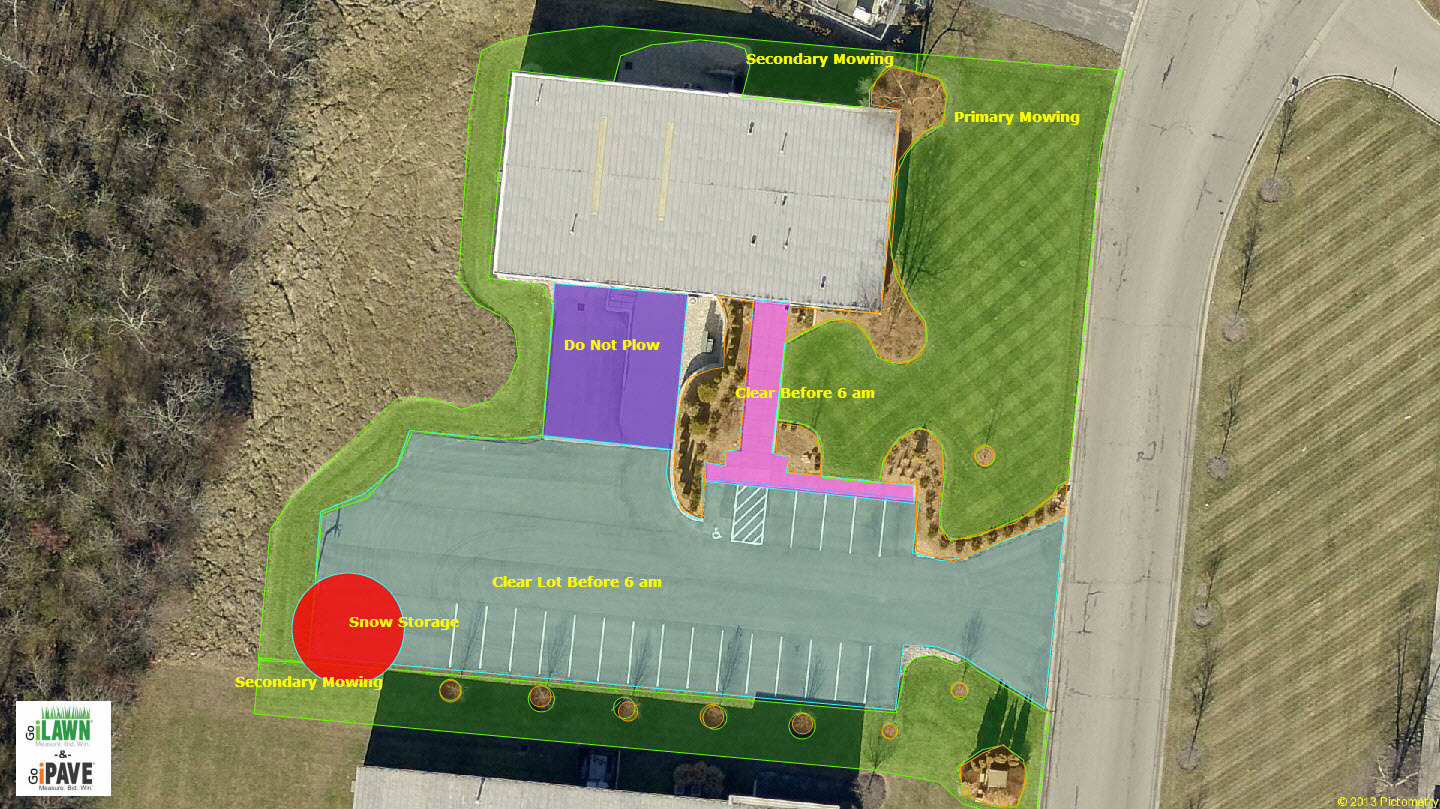Four Simple Keys to Bidding Services
Does Responding to a Request For Quote (RFQ) Make Your Head Hurt?
If you’re like many of our customers, you hate having to submit formal bids for new work. First you do a bunch of preliminary work to understand what it will cost you to get the job done. Then you write up a bid and hope your final number is low enough to win a contract yet high enough to inspire confidence and still make a decent profit.
Bidding May NOT Be Your Passion
Service industry professionals can usually cite real and compelling reasons they chose to work in this industry. Being your own boss… working in the field… being able to really SEE the results of your labor… those are a few that come to mind.
Frankly, I’ve never heard a landscape or asphalt maintenance professional say their greatest passion is writing up job proposals. So even guys who don’t find the bidding process miserable, probably don’t consider it a highlight of their job.
No Guarantees
And at the end of the day, your investment in bidding is a gamble; there’s no guarantee that you’ll make any money for your effort. But lots of lucrative commercial work gets awarded through the bidding process. …which is hard to ignore.
Quality or Volume?
When it comes to a company’s bidding strategy, companies have to balance their effort in making bids against their expectation of returns from this effort. It’s a simple matter of costs vs benefits, and there seem to be two prevailing practices.
One set of companies focuses on maximizing the quality of each bid they make, so they can maximize their chances of winning each one. Quality is key, and Volume is considered to be less important.
Another group of companies tries to maximize the number of jobs they bid, so they can increase their overall chances of winning multiple bids. Volume is key, and the Quality of each is less important.
Which one is right for you?
At Go iLawn / Go iPave, We’re For Quality
Here at Go iLawn / Go iPave, we find ourselves squarely in the Quality camp, for two main reasons.
Firstly, not all jobs are created equally. Some will fit your company’s capabilities so perfectly, that you’ll want to do everything you can to win them. They will be close to your operations center, require your most-profitable services, fall within your ideal size range, and be disproportionately profitable. Or they will offer opportunities to start breakthrough relationships with high-value clients. When either of those things happens, you need to focus heavily on winning those jobs.
Secondly, putting out inferior bids can waste your time. They can damage your reputation and even make it harder for you to win business in the future. Sure you might win some business that you might not even bid otherwise, but the long-term costs can be high.
So we believe that when you do decide to bid on a contract, you need to take the time and effort to make it a good bid.
The Pitfalls Of Bidding – A Recent Example ***
Last year we read a story out of Danville, Kentucky that really illustrates one of the major pitfalls of bidding.
In this example, two companies bid on the exact same work: “landscaping services and flowers for the city”, which we assume was outlined in greater detail in the City Council’s RFP. Yet one bid was about $49,000 and the other was about 98,000: double the other… how can that be?
While we don’t know the details, one of the following common issues could be at play here. Maybe:
- One company understood the job better than the other.
- The two companies have wildly different cost-structures, leading to different break-even points for performing the work.
- One company underbid in order to win the contract.
- One company overbid in hopes they would be the only bidder and win anyway.
- The two bids offered significantly different services in response to the RFP.
Click Here to read the story for yourself… What do you think?
Things To Think About:
At the end of the day, it appears that something went very wrong for one or both of these contractors.
- The company that won …now has to perform the contract, and it’s up to them to make sure they can do so profitably and to the satisfaction of the client. Since there were only two bids, they might also wonder if they didn’t just leave a lot of potential revenue on the table, as a much-higher bid might have still looked like a bargain.
- The company that didn’t win …invested time and effort into bidding, which led to no financial return. They’ve also just been covered in a local news article that isn’t exactly positive news coverage. And if they were offering the city a more-valuable service than their competitor, which might have justified their higher price, this important point got lost in the details.
And if you’re either of those companies, you might want to look deeper to figure out what went wrong.
Our 4 Simple Keys to Bidding Service Jobs
If you want to have success with your bids this year, here are four things you should try, which can help you avoid these kinds of bidding problems in your Service Industry business:
1. Know Your Costs:
This seems obvious. You need to understand your costs to know how to be profitable. But in many service industry businesses we’ve encountered, the cost of doing business is only vaguely understood. And the smaller the business is, the more likely that ownership and management don’t fully understand their costs.
If your company doesn’t understand what it costs to drive a mile in your trucks, it will be harder to see the added profitability of a job 2 miles from your shop vs one 8 miles away. How much facility overhead should be charged against each man-hour of labor? How much of your labor time is just indirect costs and isn’t spent performing “direct” revenue-generating work?
The better you understand these and related questions, the better you’ll understand how to be profitable.
2. Know The Job:
Take the time and effort to understand what the client wants, and then take the time and effort to understand what you’ll have to do to give it to them.
This can be the most-time-consuming part of bidding… getting the customer to tell you, in specific, understandable, and tangible terms, what he or she needs. And once you understand what they want, it’s up to you to determine what it will take to provide it. What does it mean for you?
How do you estimate now? Does an estimator drive around to each site, soak it all up, and “guesstimate” to come up with a number? Do you walk all over each site with a wheel, then pull out your scientific calculator to determine distances, volumes, and square footage to produce a facts-based quote? Or maybe you use software like Go iLawn or Go iPave to save you time and make sure you’ve got the numbers right.
Whatever you do, having a better understanding of the job will give you a strategic advantage when bidding the work.
3. Know The Competition:
City contracts are part of the public record. In the case of Danville, KY, the winning bid this year appears to be the incumbent provider. Last year, they bid unopposed, and they simply bid the same dollar amount this year as they did last. If the losing bidder had known this, maybe they would have changed their own bid or simply not wasted their time bidding the job.
While not all commercial contracts are so easy to research, building a positive relationship with the property management could give you insights into what the competition is doing for them now or has done for them in the past. Which leads us to #4…
4. Know the Customer
With commercial contracts, property managers may share details that can help you understand your position. It’s important to build a positive relationship with property manager whenever possible, so they’ll share clues about their needs when bidding time comes. Are they very price conscious and looking to get the best deal possible, or are they more concerned with job quality? Or are they managing 60 properties and just want someone who’s easy to work with?
Each contact is different, and knowing their specific concerns will help you cater to their needs.
Be in the Know:
In the end, bidding a contract is an exchange of information. A customer provides information on what they need, and a contractor provides information on what they will do. And as with any exchange of information, the more you know, the better you’ll perform.
If you know your costs, know the job, know the competition, and know the customer, you’ll be positioned to succeed in the bidding process.
Good Luck, and Happy Bidding – The Go iLawn / Go iPave team
***(Disclaimer: At the time of publication, Go iLawn / Go iPave had no known business relationships with the contractors referenced in this article, nor with the city of Danville)










Leave a Reply
Want to join the discussion?Feel free to contribute!